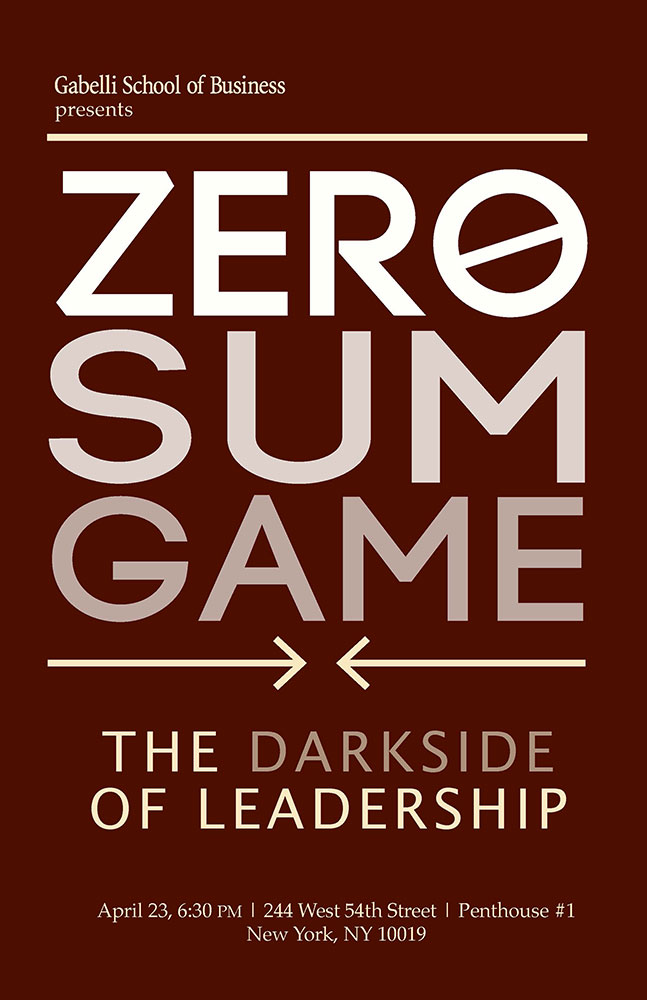Most people probably wouldn’t head to Broadway to learn about business, nor would they consider business school the best place to hone their acting skills.
That is, unless you’re Travis Russ, PhD—in which case, these are precisely the places to learn about business and theater, respectively.
This semester, Russ, an associate professor of communications and media management in the Gabelli School of Business, debuted a new hands-on class for business students, Organizational Communication and Theater. The graduate-level class examines theatrical works ranging from Shakespearean dramas to the How to Succeed in Business Without Really Trying revival starring Daniel Radcliffe in order to analyze and critique topics related to the business world.However, the students aren’t learning about business simply by reading theater. The students’ final assignment was to write an original play, which they performed April 23 at Shetler Studios.
 “This was their opportunity to write their own script critically assessing what’s going on in business and how business leaders are behaving,” said Russ, who is also artistic director of Life Jacket Theatre Company.
“This was their opportunity to write their own script critically assessing what’s going on in business and how business leaders are behaving,” said Russ, who is also artistic director of Life Jacket Theatre Company.
“It’s very challenging, and if you’d asked them at the beginning of the class if they’d be willing to get on stage, most of them would’ve said absolutely not,” he said. “But it’s a great opportunity, because they are leaning into the discomfort and are really blossoming because of it.”
The show, Zero Sum Game, is a collection of short performances depicting the dark side of leadership. Scenes feature real-life interviews with vilified CEOs, personal stories of terrible leaders, and a look at poor leadership throughout the ages.
“It covers a broad range of bad leadership, from the incompetent CEO to the villainous boss to the really mean high school gym teacher,” said MBA student Nick Monteleone, FCRH ’02, who is in Russ’ class.
During the workshop phase of the semester, each student wrote more than half a dozen original scenes relating to a business experience. The pieces could be based on a personal experience or could be completely fictionalized. Then, the class voted on each student’s best piece, and the selections were gathered together to make Zero Sum Game.
Monteleone’s scene portrays his experience of being the casualty of a mass layoff at a former company. He hopes the audience will be able to empathize with the unpleasant yet ultimately edifying experience, which offers a rare glimpse into the emotional turmoil behind business practices.
Other pieces include a monologue from the perspective of Vogue editor-in-chief Anna Wintour, a Dr. Seuss-inspired piece about women in the workplace, and a musical number about the underdogs.
“It was a challenging experience, especially because I wasn’t expecting such a heavy emphasis on performance,” Monteleone said. “But it forced me to really think about how to approach the material and how to mold it for an audience, as opposed to just writing it for yourself.”

The first half of the class consisted of reading plays and attending performances, which the students analyzed in terms of the underlying messages about organizational communication. The students also heard directly from playwrights who visited the class. Among them was recent Guggenheim Fellowship-winner Lucas Hnath, whose 2013 play, A Public Reading of An Unproduced Screenplay About the Death of Walt Disney, takes a critical look at who in our society are hailed as leaders.
“The students were able to ask [Hnath] questions about why he wrote particular scenes and what message he was intending to send, and he was able to tell them about some of his own experiences in the business world. Hnath, in turn, had the opportunity to hear about what current business students were taking from his play,” Russ said.
“Theater makes interesting commentary about the business world—how effective it is, how ethical it is, whom we look to for leadership, and so on,” he continued. “These are theatrical case studies, which are more alive and much more vivid for the students than just reading case studies about a business situation.”
Photos by Kelly Milnes, GABELLI, MS ’15

